-
Viewpoint on 'IONS'
Viewpoint on 'Scientific Literacy'
- Proudly sponsored by
-


-
Refractive Index: To the Limits and Beyond
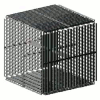
Beyond what is naturally possible... metamaterials offer new unexplored opportunities to manipulate light. Researchers show the possibility to enhance the index of refraction of a material beyond natural limits.
-
A Wind Tunnel for Quantum Physics
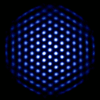
Simulating quantum phenomena on today’s computers can be extremely challenging. Yet, just like the wind tunnel changed the trajectory of modern aviation, new specially built quantum simulators may soon guide the design of tailor-made quantum materials.
-
The Five Dimensions of Optical Storage
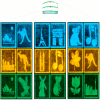
Can 300 DVDs be squeezed into a single optical disc? Ground breaking research in the field of surface plasmon physics seems to suggest so.
Asking Twice,
Yet Knowing Nothing
Have you ever been confused by an answer? Usually answers increase our knowledge, but latest experiments now show that asking two weak questions can leave us with less information than asking only one.
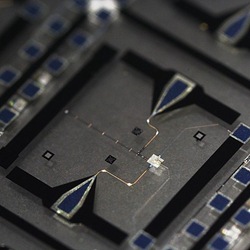
Weak quantum questions. The researchers verified that a series of two weak quantum measuments can lead to restore the original state. The second measurement effectively undoes the effect of the first one. The picture shows the heart of the setup, where the qubits were generated and handled. Picture: Erik Lucero, Martinis Group.
Just like there are different types of questions, there are different types of measurements. There are, for example, many different ways of asking someone to marry you; some are relaxed, others pushy, some are traditional and romantic, while others may be extravagant. All these styles may give a different edge to a question. Equivalently, there are very different types of measurement. For the sake of argument, let us focus on yes/no-type questions and, hence, on experiments with two possible outcomes: signal or no signal, that is, answer or no answer.
Often we ask strong questions: decide now and tell me if you will marry me! A strong question must be answered immediately and conclusively: either yes or no. In quantum physics, a strong measurement causes the status of the system to collapse into a specific state. For example, if a photon passes through a polarizer, its polarization corresponds to that of the polarizer. If it does not pass, then its polarization is orthogonal to that of the polarizer. The photon must conclusively answer the questions: is your polarization that of the polarizer?
In recent years, however, scientists have become more and more interested on weak questions: in case you are ready to take a decision right now, please tell me if you would like to marry me. Such question does not prompt for an answer and if there is no answer, all we know is that there was no positive decision taken. We might illustrate this setting with a damaged polarizer with holes, where photons can be polarized, or else not be affected at all by the damaged polarizer. This, again, leaves us with the same three possibilities: yes, no, and no decision taken.
Of course, a null result does increase the probability of a negative answer. Imagine your great love is undecided before you ask the question and each time you ask, their indecision lies between to marry, not to marry, and have not decided in equal measure. Since the question was not answered, you know that they did not choose to marry and, hence, you are left with two options: either a no answer or a have not yet decided answer. If you were to ask the same question a second time, your odds would be worse than 33% since you already know that they have not chosen to marry. Your only chance would be to hope that, this time, the answer would be not decided and that they would, at the moment, change from not decided to to marry. So asking the same question twice will not in itself restore the initial condition of having equal probabilities for all three possibilities.
So how could you restore the initial condition of having equal probabilities after a first null result? By asking the opposite question: the second time, you can say please say yes, if you wish to decide right now not to marry me. This time, not getting an answer means that they did not choose not to marry. From the first question you therefore know that they did not choose marry, and not answering the second question tells you that they did not choose not to marry either. In fact, if you are very courageous, you may well try to play the whole game again; but if you intend to get married, be careful: getting two null results is not something you will get each time you ask; and after getting a first null result, the probability for getting a not to marry is higher than the probability of getting to marry! Nonetheless, not enforcing an answer and picking your second weak question in this way will lead to the deleting of the information acquired through the first question.
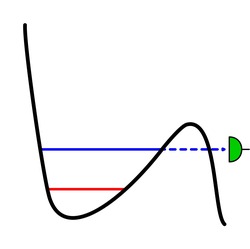
Schematic representation of a weak measurement. The particle is trapped in a potential (black) and can be in any superposition of the two states (red and blue). From the blue state, there is a probability to tunnel (dashed blue) out of the potential and being measured by the detector (green).
"I think this experiment is undoubtedly a breakthrough, and believe that it will be seen as a landmark paper," Andrew Jordan [1] from the University of Rochester says. As a specialist on weak measurements, he points out that many textbooks describe measurements in quantum mechanics as instantaneous and inherently irreversible. "We now know that wavefunction collapse is neither, and that these properties only emerge as a special case."
Apart from its importance for fundamental research, both Katz and Jordan see a lot of potential for future applications. "Everyone always talks about quantum computers (and that is fine), but look at the progress that has been made in quantum communication and cryptography," Jordan points out. He is convinced that in the next 10-25 years, "these aspects will make the largest impacts on technology." Katz agrees but focuses rather on advancing experimental capabilities. "Ultimately," he concludes, "the better we are able to control these systems, the more we can push the envelope, the more we can play with physics; and this is typically where the greatest ideas are born."
[1] A. N. Korotkov and A. N. Jordan, Undoing a Weak Quantum Measurement of a Solid-State Qubit, Phys. Rev. Lett. 97, 166805 (2006).
Armand Niederberger
2009 © Optics & Photonics Focus
AN is currently working on his PhD on disordered ultracold quantum systems at ICFO - The Institute of Photonic Sciences in Barcelona (Spain).

Nadav Katz, Matthew Neeley, M. Ansmann, Radoslaw C. Bialczak, M. Hofheinz, Erik Lucero, A. O'Connell, H. Wang, A. N. Cleland, John M. Martinis, and Alexander N. Korotkov, Reversal of the Weak Measurement of a Quantum State in a Superconducting Phase Qubit, Physical Review Letters (2008) 101, 200401 (link).